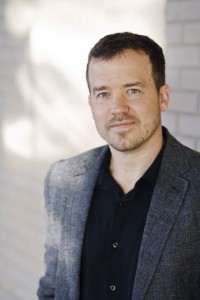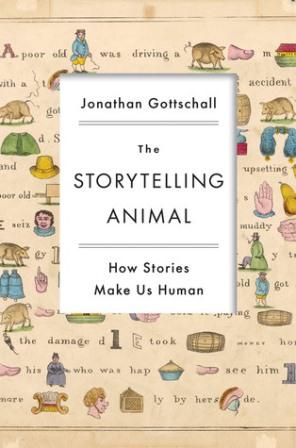Book Review: The Survival of the Fittest Yarnspinner
Reading The Storytelling Animal is akin to listening to a series of terrific humanities lectures given by a polymath professor with a P.T. Barnum streak.
The Storytelling Animal: How Stories Make Use Human by Jonathan Gottschall. Houghton Mifflin Harcourt, 248 pages, $24.
By Maureen Dezell
Arriving at a time when the average American spends less than 20 minutes each day reading anything at all, Jonathan Gottschall’s The Storytelling Animal is a welcome manifesto for the enduring power and pleasures of fiction. Humans have evolved to crave stories, Gottschall argues, and that is why “we still thrill to an astonishing multitude of fictions on pages, on stages, and on screens.”
An English professor, author (The Rape of Troy: Evolution, Violence and the World of Homer), and journalist, Gottschall is a prominent figure in what’s known as the literary Darwinist movement. This is a controversial, loosely knit group of humanists and scientists who posit that biology, not culture or discourse, shapes behavior, thinking, and the stories we tell, that scientific principles and empirical research should inform inquiries in literature and culture.
Caustic claims and counterclaims about neo-Darwinist theory have simmered in the cauldrons of academia during the past decade. Meanwhile, Gottschall has written a lively, general-interest introduction to the subject in The Storytelling Animal. Prolifically researched, thought provoking, and frequently entertaining, the book puts an evolutionary spin on Joan Didion’s aphorism: We tell stories in order to survive.
Gottschall assembles a slew of scholarship from across the academic disciplines. He bolsters it with illustrations from sources ranging from Titus Andronicus to The Girl with a Dragon Tattoo and classical myths to MMORPG (massively multiplayer, online role-playing games) to show that “fictions” of all sort “suck us in” as children at play, adults who dream and fantasize, religious observers, and social animals trading news and gossip.
Gottschall quotes Aristotle, Steven Pinker, sitcoms, and research on mirror neurons to make a case that the monomyths and master stories told across cultures and throughout the millennia hew to a handful of master themes because they simulate real-life situations. “The human mind was shaped for story so that it could be shaped by story,” he argues. “The constant firing of our neurons in response to fictional stimuli strengthens and refines the neural pathways that lead to skillful navigation of life’s problems.” To show the mind has evolved to impose meaning on random events, he explores issues of purpose and intent through Sherlock Holmes mysteries and a 1944 psychology study of subjects watching geometric shapes move randomly around.
Neo-Darwinist thinkers, Gottschall included, don’t yet agree on whether storytelling is an evolutionary adaptation or byproduct. He writes that some, “following Darwin,” suspect the evolutionary source of story may be a form of sexual selection; that storytellers (shamans, bards, advance men for Medieval theater troupes, slam poets, rap stars) have so successfully strutted their stories throughout the ages to show off and seduce listeners that the trait was passed on. Others like Brian Boyd (On the Origin of Stories: Evolution, Cognition and Fiction) consider fiction “a playground for the mind,” a form of play—itself an evolutionary adaptation—“that does the same sort of work for our mental muscles that rough-and-tumble play does for our physical muscles.” Gottschall also writes that a number of literary neo-Darwinists consider storytelling “a form of social glue that brings people together around common values.”
Gottschall is convinced that “a penchant for the pretend has helped humans function better as individuals and in groups,” and he is particularly enamored with the idea that fiction is “good for us.” Unfortunately, his book is weakest when he expands his claims for the salutary effects of story to ethical and moral realms. Reading The Storytelling Animal is akin to listening to a series of terrific humanities lectures given by a polymath professor with a P. T. Barnum streak. He can’t stop pushing—or pumping up—his thesis, even once he’s used up his best material.

Jonathan Gottschall — he makes a good case for the value of storytelling, though he goes into argumentative overdrive.
It is one thing, for example, to point to a study showing that people who watch a lot of TV fiction are more inclined to believe in “poetic justice” than those who primarily watch news to suggest that TV watching may encourage the kind of social awareness that helps strengthen social bonds. It is quite another to proclaim it as evidence that “Story—sacred and profane—is perhaps the main cohering force in human life.”
Gottschall tends to bolster his more overreaching and reductive arguments with overstuffed narrative. A chapter called “Ink People Change the World,” for instance, employs a cringe-inducing metaphor to make a credulous case that fictional characters (“ink people”) have altered the course of human events. “Ink People,” he writes, “live in ink houses inside ink towns. . . . They shape our behaviors and our customs, and in so doing, they transform societies and histories.”
Take, for example, Rienzi, eponymous hero of Edward Bulwer-Litton’s Rienzi, a novel Richard Wagner turned into an opera that is said, according to Gottschall, to have inspired a young Adolph Hitler. The author stops short of blaming “Wagner’s ink people”—Siegfried, Parsifal, Renzi—for instigating the Second World War. Still, he notes that these ink people told their story in songs that “changed Adolph Hitler and, through Hitler, the world.” He ends the chapter with an overweening World War II reference, describing the massive burnings of anti-German books in May 1933: “The Nazis, deeply inspired by Wagner’s musical stories, understood that ink people are among the most powerful and dangerous people in the world. And so they committed a holocaust of undesirable ink people, so there would be fewer barriers to a holocaust of real people.”
Fortunately, most of Gottschall’s arguments are more sophisticated, his writing more deft. Intriguing and engaging if not always convincing, The Storytelling Animal, in the end, spins a good yarn.
Tagged: Jonathan Gottschall, Story, art, fiction, storytelling


